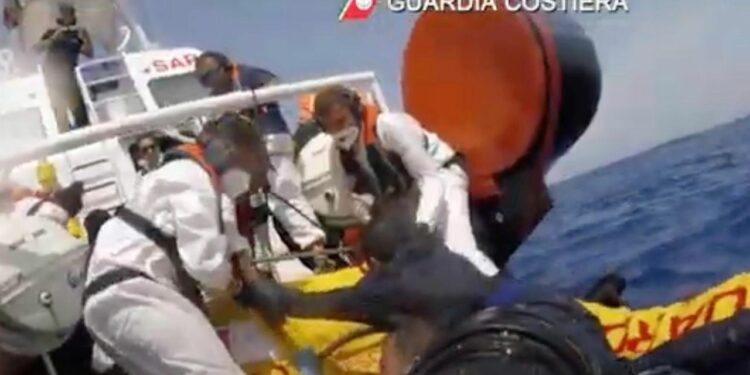The image made from a video provided by the Italian coast guard shows a patrol boat rescuing migrants from a sinking ship off the coast of Lampedusa, Italy. Credit: AP/Uncredited
In December, the auditors visited the site of a maritime rescue coordination center on the Libyan coast. Italy was tasked in 2017 with helping the Libyans to set it up. Millions of euros were earmarked for the task and containers of equipment sent, but seven years on it is still not operational.
Under international rules governing the safety of life at sea — rules that are recognized and accepted by the EU — Libya must have such a center and permanently staff it. In the meantime, Italy has mostly coordinated the effort in Libya’s waters, deciding which ships should respond to emergencies.
The commission, for its part, mostly accepted the report’s recommendations on how to improve things.
It acknowledged “that there is a need to further reinforce its capacity to identify and mitigate risks, including by defining specific activities or output indicators in high risks sectors for human rights. This will be addressed by providing more detailed sectoral guidance material and training.”
The commission underlined that, as of last year, the fund had helped to send 73,215 migrants voluntarily back to their home countries. In the first half of 2023, it said, 11,087 jobs were created or supported, mostly in Guinea and Senegal, while 23,266 people received skills training.
Source link : http://www.bing.com/news/apiclick.aspx?ref=FexRss&aid=&tid=66f429ead6a641ac9bc30840a10f965c&url=https%3A%2F%2Fwww.newsday.com%2Fnews%2Fnation%2Fmigration-eu-auditors-africa-libya-fund-f66965&c=4706063057302769966&mkt=de-de
Author :
Publish date : 2024-09-25 08:02:00
Copyright for syndicated content belongs to the linked Source.


